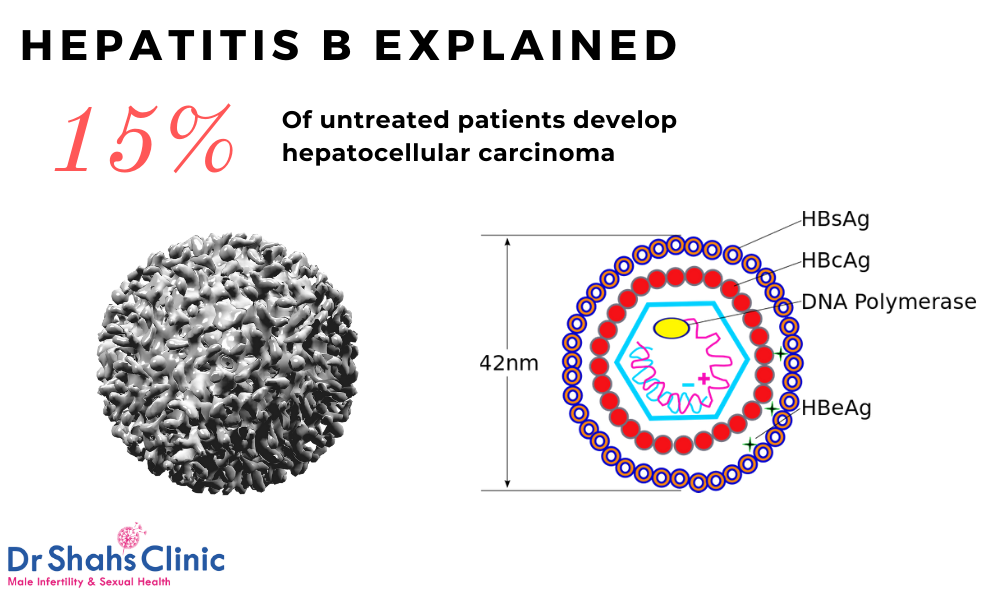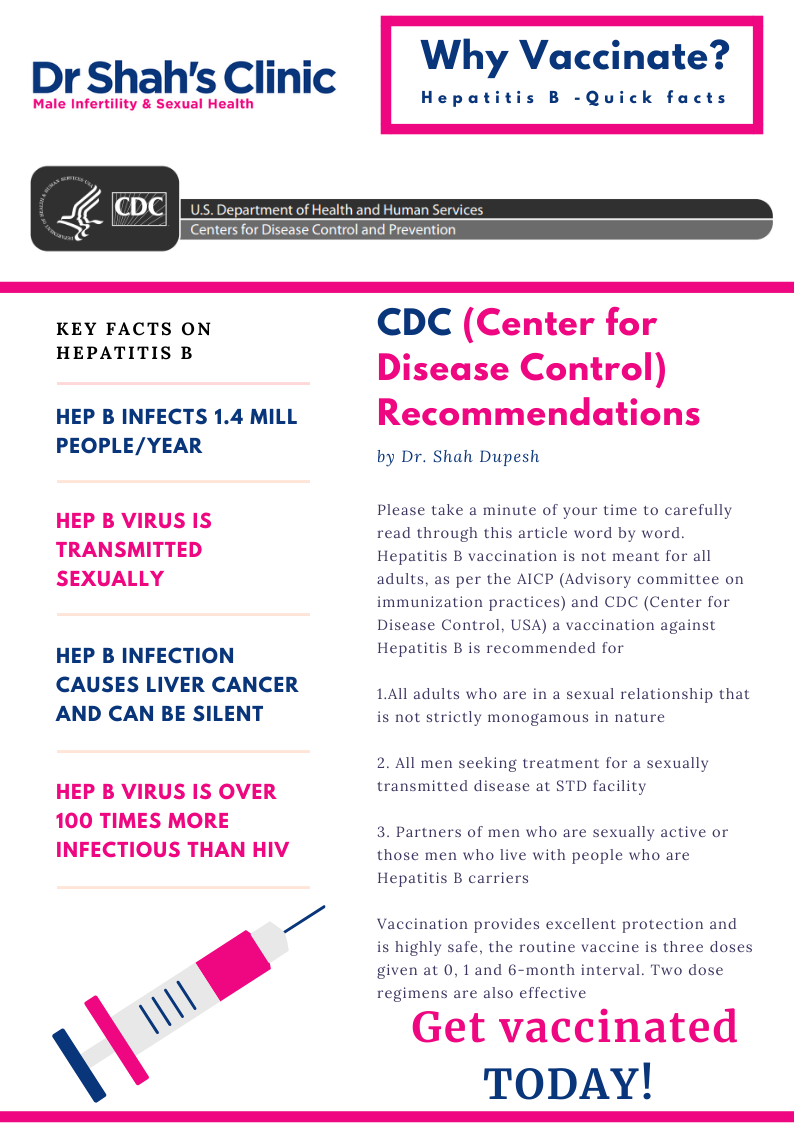Hepatitis B Treatment, Symptoms, Diagnosis & Risk Factors
Vanakkam, Namaste, and Welcome to Dr. Shah’s Clinic for Male Infertility & Sexual Health. I am a practicing sexology doctor and in this article, I am going to tell you everything under the sun about Hepatitis B Treatment.
We are also going to discuss about in-depth about Hepatitis B vaccination and prevention.
Can Hepatitis B Kill you? Whats the big deal?
In India, hepatitis B affects close to 50 million individuals.
Hepatitis B is a viral infection that primarily through unprotected sexual contact and also household contact (saliva, sharing toothbrushes) with infected individuals.
It primarily affects the liver.
Moreover, when left untreated, it can lead to fulminant hepatic failure and also hepatocellular carcinoma.
Interestingly, in South India, hepatitis B infection is seen in over 43% of individuals diagnosed with hepatocellular carcinoma.
On an important note, over 15 to 25% of patients with active infection who do not receive any hepatitis B will develop liver failure and/or liver cancer.
Hepatitis B is caused by the HBV virus. Its a DNA virus and it spreads through blood products and secretions like saliva, semen, vaginal secretions et cetera.
In our population, a large proportion of infections seem to spread through household contact. India has been categorized as a medium endemic zone for Hepatitis B.
Sadly, the vaccination program for Hepatitis B started only in the year 2011, which is not helping in terms of disease burden.
A large number of patients are dying due to liver failure, the top reason, of course, being Alcoholic liver disease and Hepatitis B.
The good news though is that
Vaccination for Hepatitis B is Safe, Effective & Available
How does Hepatitis B spread?
Hepatitis B can spread through
- Unprotected sexual contact (Semen and vaginal fluid)
- Men who have sex with men (high risk)
- Men who regularly have intercourse with commercial sex workers (high risk)
- Contaminated unscreened blood products (high risk)
- Saliva (shared toothbrushes)
- From HBsAg Positive Mother to child
- From medical procedures
- Also mainly among injecting drug users, tattooing, piercing et cetera
- Sexual Assualt
Screening for Hepatitis B
The CDC (Center for disease control) recommends screening for all men and women for Hepatitis B who fit the criteria mentioned below
- Men who have sex with men
- Men who engage with multiple partners
- Women who engage with multiple partners
- Injecting drug users
- All health care personnel
- Infants born to women who have a known HbSAg positive status
- Men infected with HIV
- Patients who require chemotherapy or immunosuppression
- Recent travelers to endemic regions who engaged in unprotected sexual intercourse
- For all patients who have elevated liver enzymes
- Also for Patients who are living in with HBV positive partners
- Patients not previously vaccinated
- And Lastly survivors of sexual assault
What are the symptoms of Hepatitis B?
Interestingly, most people do not experience any major symptoms at all. Therefore, this disease is known to be notoriously silent.
Some common symptoms reported by patients include
A. Yellowing of skin and eyes
B. Dark urine
C. Extreme Fatigue
D. Nausea & Vomiting
E. Abdominal Pain
However, in a small proportion of patients though, hepatitis B can result in acute liver failure and death.
HIV & HBV Co-infection Risk
Sadly, up to 7.4% of HIV infected patients do harbor Hepatitis B infection. Moreover, about 1% of hepatitis B patients harbor hidden HIV infection.
Thus the recommendations are clear, screening for both HIV & Hepatitis B is definitely recommended for at-risk patients.
For instance in South India, studies indicate that up to 9% of patients with Hepatitis B also harbor HIV infection.
Moreover, for HIV-HBV Co-infections, treatment regimens as recommended by the WHO are drugs like Tenofovir which are active against both HIV and Hepatitis B.
Testing for Hepatitis B
Most importantly, Hepatitis B testing involves blood tests.
Common tests that your sexologist will use in the testing for Hep B infection and assessment of its stage are
- Firstly, the Hepatitis B Surface Antigen test
- Secondly, the Hepatitis B Surface Antibody
- Thirdly the Hepatitis B e antigen
- Lastly the Hepatitis B core antibody & HBV DNA
Most importantly, the presence of Hepatitis B surface antigen and Hepatitis B e antigen indicates active infection.
Thus, the assessment of HBV DNA also helps in these cases.
But, the core aim of therapy is to prevent a chronic carrier state and thereby liver failure. Therefore, all therapies are aimed at seroconversion (i.e Hepatitis e + antigen state to Hepatitis e – antigen state) along with reducing the HBV DNA load to undetectable limits.
Furthermore, the liver enzymes will also be closely monitored during the therapy. Assessing the stage of your hepatitis B infection becomes very important before beginning a Hepatitis B treatment. This is because the disease progresses in 3 distinct stages.
Vaccination for Hepatitis B
The age-old saying that ‘prevention is better than cure’ is best applicable to Hepatitis B treatment. Hepatitis B vaccination gives lasting protection for the better part of 20 years and moreover, its over 95% efficient in terms of conferring protection.
Furthermore, the WHO and CDC both strongly recommend Hepatitis B vaccination in the following groups of people
- All men or women who have not been previously vaccinated in their childhood
- Men who have sex with men
- For all men or women who have sex with multiple partners
- All patients who are seeking for an evaluation of an STD (Sexually transmitted disease like Chlamydia or Gonorrhea or HIV or syphilis and Herpes treatment)
- All persons who specifically seek protection from HBV infection
- Injecting drug users
- Partners of Hepatitis B positive patients including household contact
What is the schedule for the hepatitis B vaccine for adults?
For adults, the CDC recommends a 2 dose vaccine. On the other hand, for infants, a three-dose regimen is recommended.
Moreover, in adults, the 2 dose vaccine is placed 28 days apart.
To conclude, getting yourself vaccinated against Hepatitis B is the best thing you can do. Here is a quick information sheet for you to read!
Now, let’s move on to the last section of the article.
Hepatitis B treatment
Firstly, for acute hepatitis B, there is no treatment. The idea is to simply stabilize the patient at the earliest and prevent damage.
Secondly, for chronic hepatitis B, the overall objective of treatment is to reduce the viral load and viral replication to a very low undetectable level. This is done ultimately to prevent permanent liver damage and also hepatocellular carcinoma.
Most importantly, 3 markers of treatment effectiveness are
A. Loss of Hepatitis B e antigen
B. Normalizing of the liver enzyme called ALT
C. A decrease in the serum HBV DNA
D. Improvement of the liver histology
Consequently, close monitoring of the infection and reevaluation every 6 to 12 months is recommended. Medical therapy in Hepatitis B treatment is now well validated. The choice of medications include
Firstly, pegylated alpha 2 interferon, secondly tenofovir and thirdly a drug called entecavir.
Moreover, both tenofovir and entecavir are drugs that are taken orally, usually 1 tablet a day for a full year.
Studies suggest that these drugs cause good seroconversion in about 80% of patients. They are also well tolerated. However, close monitoring of renal function is a must.
Lastly, medications are usually continued till about 3 years coupled with close monitoring.
That’s about it!
To conclude, I sincerely hope you enjoyed reading this article on hepatitis B treatment in chennai. At Dr. Shahs Clinic we will help you hand in hand through your problem
Schedule a consultation with us here
Dr. Shah’s Clinic for Male Infertility & Sexual Health
No 21, Ground Floor, Bazullah Road, T. Nagar, Chennai, Tamil Nadu 600017
Ph – +91-9790783856
References


